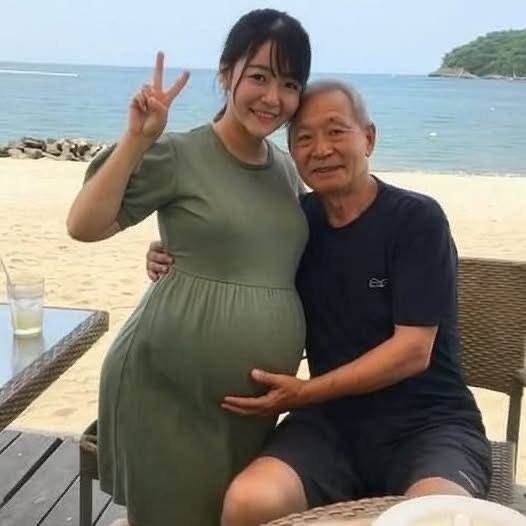When 26-year-old Yuki told her friends she was marrying a 70-year-old man named Mr. Kenji, the reaction was instant and explosive. The group chat lit up like fireworks—shocked emojis, “WHAT?!” in all caps, questions flying faster than she could read them.

“Is this a joke?”
“Are you okay?”
“Are you sure you know what you’re doing?”
But Yuki wasn’t interested in convincing anyone. She had already made her choice.
It had all begun a few months earlier, during what she called her “quarter-life breakdown.” She’d walked out of a job she’d hated for years, the kind where every Monday felt like the start of a prison sentence. That same week, she discovered that her ex-boyfriend—whom she’d still quietly hoped to reconcile with—was now dating her former boss. It was a humiliation that hit her in the gut, harder than she wanted to admit.
She packed a small bag, told no one where she was going, and bought a train ticket to Okinawa. Her plan was simple: to disappear for a while. She’d find a quiet place by the ocean, keep to herself, and maybe—just maybe—figure out how to breathe again.
For the first few days, she barely spoke to anyone. She woke up late, wandered the shoreline collecting shells, and sat on the sand watching the horizon until the sun slipped beneath it. She joked to herself that she was halfway to becoming a hermit who only spoke to sea turtles.
That’s when she met Kenji.
It was one of those blindingly bright afternoons when the heat pressed down like a weight. Yuki had been walking along the beach when she noticed a small shaded spot under a faded parasol. Sitting there was an older man, silver-haired and dressed in a crisp white linen shirt. He was sipping lemonade from a tall glass, the condensation pooling in the sand.
When their eyes met, he smiled—not the kind of smile that demands something, but the kind that simply acknowledges your existence in the gentlest way.
“You look like you could use a drink,” he said in a calm, gravelly voice.
She hesitated for a second, then accepted the offer. He poured her a glass from a pitcher beside him, handed it over, and gestured for her to sit.
What was supposed to be a polite five-minute chat turned into a three-hour conversation. She learned his name—Kenji—and that he had spent most of his life as a photographer, traveling across Japan and beyond. He told her stories about capturing typhoon waves at midnight, about strangers who became friends in train stations, about a little coffee shop in Kyoto where the same couple had sat at the same table every Sunday for thirty years.
When she spoke, he listened—really listened—in a way Yuki realized no one had in a long time. She found herself telling him about her job, her heartbreak, and her feeling that life was something happening to other people while she just stood on the sidelines.
Over the next few days, they kept bumping into each other—at the local market, near the harbor, even at the tiny café where Yuki had started having breakfast. Eventually, it stopped being coincidence. They started meeting on purpose.
One evening, Kenji brought a small speaker down to the beach and played old Elvis songs. He asked her to dance. She laughed at first, thinking he was joking, but he simply extended his hand and waited. They danced barefoot in the sand, the tide creeping closer with each step, her laughter mixing with the warm night air.
In those moments, the 44-year age gap melted away. She stopped thinking about numbers, about timelines, about how it looked from the outside. With Kenji, she felt seen, heard, and safe.
Ten days after that first meeting, Kenji asked her a question—not with a grand proposal or a diamond ring, but over morning coffee as sunlight poured into the little seaside café.
“Would you like to spend the rest of your life with me?”
It was quiet. Simple. Sincere.
And without hesitation, Yuki said yes.
Her friends couldn’t understand it. Some accused her of making a mistake, others hinted at ulterior motives. But Yuki didn’t need their approval. She knew what she’d found was rare—a love built not on appearances or convention, but on kindness, trust, and the joy of truly knowing one another.
Their wedding was small. Just a handful of guests on the beach where they’d met, with the sea breeze carrying their vows out toward the horizon. Kenji wore a light gray suit. Yuki wore a simple white dress that fluttered in the wind. When they danced that night, it was again to Elvis, the song “Can’t Help Falling in Love” floating into the darkening sky.
Today, they live in a small house with wide windows that look out over the ocean. Mornings start with coffee and conversation. Evenings end with the sound of waves rolling against the shore. They still dance sometimes—barefoot in the sand—laughing like the world belongs to just them.
For Yuki, love didn’t look like what she’d been taught to expect. It was better.




